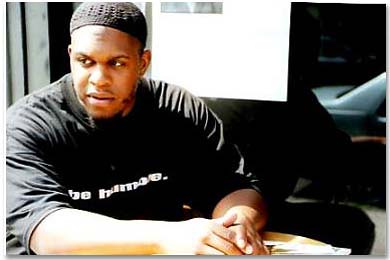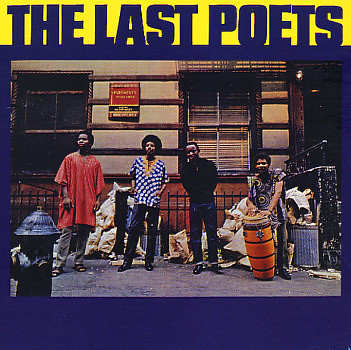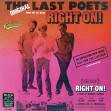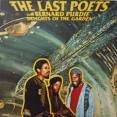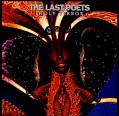Islam is at the heart of an emerging global anti-hegemonic culture that combines diasporic and local cultural elements, and blends Arab, Islamic, black and Hispanic factors to generate "a revolutionary black, Asian and Hispanic globalization, with its own dynamic counter-modernity constructed in order to fight global imperialism. (say what!)
Thursday, May 26, 2005
a coincidence you think this is?
So back when Episode I: The Phantom Menace first came out, The Muslim Magazine (currently on hiatus) had some interesting pieces on the connections between Islam and the content of the Star Wars films. One was an interview with Dhul-Nun Owen who talks about how George Lucas had contacted members of the Habibiyyah Sufi order in Berkeley, CA in order to do research for Star Wars. There was also a piece by Mahmoud Shelton about how Sufi ideas of spiritual chivalry (futuwwat) have parallels in the Jedi teachings. (Shelton is probably more well-known for writing Alchemy in Middle-Earth: The Significance of J.R.R. Tolkien's The Lord of the Rings which points to some of the Islamic concepts which appear in Tolkien's work.)
In any case, there are some interesting ways in which Islamic themes either accidentally or quite deliberately appear in the Star Wars saga. One can point to how Tunisia was used as the location to film the scenes set on Tatooine. Or how Coruscant (the capital of the galactic republic) sounds like Khorasan. Or how "jeddi" and "palawan" (padawan?) were titles used by Muslim knights. (actually here is an interesting page on jihad and futuwwat which uses the term "jeddi"). Or how many awliya are thought to experience a certain kind of life where they are still present after death. Or how there are accounts associated with Ali (ra) about a "sword of light" (light-saber?). Or the idea (also associated with Ali) that ones intentions in battle must always be pure and that it is wrong to kill out of anger, even in when one is outwardly justified. And of course the most obvious connection to Islam is the long-lived Jedi master Yoda (better known as the Green Man or Khidr).
A coincidence do you think this is?
Wednesday, May 25, 2005
so i finally saw it
I just saw Episode III last night, and to be honest I was a little disappointed. The special effects were of course "amazing" but I'm not sure if they were worth the money. Of course, the movie was orders of magnitude better than Episodes I and II, but that's not setting the bar very high. I would actually recommend the novelization of Revenge of the Sith by Matthew Stover. The dialogue is better, the background story is more fleshed out, the significance of events is more apparent. And I was especially surprised at how rich the descriptions of the various duels and fights were. A big part of my disappointment with seeing it in the theatre was due to the fact that the film's portrayal of the lightsaber duels and other action sequences didn't convey the same meaning found in the novel's descriptions.
If you haven't seen the movie yet, I don't want to give away too many details. But I will say that unfortunately there is NOT a scene where Mace Windu says "...And I will strike down upon thee with great vengeance and furious anger those who would attempt to poison and destroy my brothers. And you will know my name is the Lord when I lay my vengeance upon thee. ..." right before killing Jar Jar Binks with a light saber.
Now that the series is "over". I wonder what stories would have made up episodes VII, VIII and IX? There are many novels and graphic novels (i.e. fancy comic books) which deal with the events following Return of the Jedi. The New Republic arises out of the ashes of the empire. Kind of like the Contras in Nicaragua, there are still Imperial forces lying around which need to get mopped up by the new fledgling government. Han Solo and Princess Leia have kids. Luke Skywalker reconstructs the Jedis in order to protect the New Republic and he also eventually marries and has at least one child of his own. And of course, there are many snags and obstacles along the way. Beloved characters fall. Noble Jedi are tempted into the dark. And life goes on. I don't know if George Lucas will really get around to making the last three episodes. But if you are really overcome by curiosity over what happens to the characters, it is easy enough to take a trip to the sci-fi section of your local bookstore and read for yourself.
Tuesday, May 24, 2005
muslim watch on empire
Monday, May 23, 2005
tariq ramadan and globalization
another world is possible
comtemporary art from the islamic world
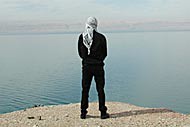
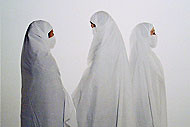
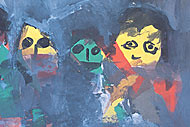

I just found this interesting website which features contemporary art coming out of Muslim countries. Actually its an entire online magazine with 10 issues archived. Each issue features exhibitions from several artists and includes a decent number of images plus some brief descriptions of the artists and their work. It's supported by the Institute for Foreign Cultural Relations (in Germany).
The index page is available here.
Saturday, May 21, 2005
muslim eye for the straight guy
First, Vagina Monologues:
According to one of the monologues, the last recorded clitoridectomy to occur in the United States was performed in 1948 on a five-year old girl to cure her of masturbation. But other sources suggest that it has been done on female patients as recently as the 50's. I only mention this to say that neither Muslims nor Africans have some kind of exclusive copyright on the practice.
Very often, in a multitude of ways, legitimate concerns for the well-being and position of women in society are used as a club to reinforce racist or otherwise prejudiced attitudes towards certain communities. I don't know what the perfect response/solution is but one which comes to mind is to prescribe a healthy dose of history.
As societies or civilizations, "Islam" and "The West" are not these rigid unchanging things. On both sides, the position of women changes over time and there is no reason to think that it won't continue to change. For long periods during their mutual histories, the position of women has actually been higher in Muslim societies than in Western ones. And from the position of world history, the gains which women have made in the West are quite recent. For example, even if you want to look at this past century, women in Turkey had the right to vote and stand for election before women in France. And Pakistani women had the right to vote and run for office election several decades before women in Switzerland.
So there is no reason to think that women in Muslim societies won't continue to achieve greater opportunity and justice. And there is no reason for Western societies to rest on their laurels. All societies fall short, and all societies have work which urgently needs to be done on this front.
Secondly, Fight Club:
This is a huge oversimplification, but basically Fight Club is a novel about groups of men who find their manhood by getting together and beating each other up. Part of the idea is that modern-life is so emasculating that men feel a need to go to some serious extremes just to compensate. And even in the real world, it seems like in many ways a lot of men feel that they don't quite know how to be men and need to join groups to figure out how; from Promise Keepers, to the Million Man March, to Robert Bly's Men's Movement, etc. Even Queer Eye for the Straight Guy can be viewed as a bizarre and indirect manifestation of the same phenomena.
So how does this phenomena affect Muslim men? I think that's an open-ended question which is worth some further discussion. Off the top of my head I'd say that you probably could find examples of men who "don't know how to be men" and engage in unhealthy or negative behaviors. But I would also suspect that some aspects associated with Islam (clearer gender roles, notions of "male space" and "female space", etc.) are positive and healthy (if they aren't taken to abusive extremes.)
What do people out there think? Is there a need for a Muslim Men's Movement to heal our collective psychic wounds?
Friday, May 20, 2005
are emily and greg more employable than lakisha and jamal?
If you are interested in more of the nuances and details:
Here is their original paper
muwakkil on domestic terrorism
afro-mexicans represent!!!
Mexico in the Context of the Trans-Atlantic Slave Trade
and also a link to the
Black Mexico Homepage
salim muwakkil

Salim Muwakkil is a senior editor at IN THESE TIMES magazine. He is an Op-Ed columnist for the CHICAGO TRIBUNE, a member of the editorial board, and a columnist for, the Madison-based Progressive Media Project, an advisory board member of Free Press and a 2000 Media Fellow of the Soros Open Society Institute. He was a contributing columnist for the Op-Ed page of the CHICAGO SUN-TIMES from 1993 to 1997. His work has won him many awards - including the Studs Terkel Award for journalistic excellence.
Salim Muwakkil is a contributing author to six books: APPEAL TO REASON: 25 YEARS IN THESE TIMES, 2002; STATES OF CONFINEMENT, 2000; THE FARRAKHAN FACTOR: AFRICAN-AMERICAN WRITERS ON MINISTER LOUIS FARRAKHAN, 1998; THE BELL CURVE DEBATE, 1995; COLLATERAL DAMAGE: THE NEW WORLD ORDER AT HOME AND ABROAD, 1992; INSIDE THE L.A. RIOTS, 1992.
From 1986 to 1990 he taught journalism at Chicago's Columbia College. He has also been an adjunct professor at the School of the Art Institute of Chicago's Film Center, Northwestern University's Medill School of Journalism, the Associated Colleges of the Midwest's Urban Studies, and the University of Illinois in 2001.
From 1995-96 Muwakkil was a co-host of Pacifica News' network daily "Democracy Now" program and from 1993 to 1996 he hosted a weekly talk show on Chicago radio station WVON-AM. Muwakkil is a frequent guest on CHICAGO TONIGHT, a public affairs program on PBS, BEYOND THE BELTWAY, a nationally syndicated radio program of political commentary. He has provided on-air political analysis for Fox TV News in Chicago and is an occasional commentator for the Pacifica News Network, the Canadian Broadcasting Corporation and Monitor Radio.
Mr. Muwakkil's work has been published in a wide range of publications, including THE BLACK SCHOLAR, NEW YORK TIMES BOOK REVIEW, THE WASHINGTON POST, THE PROGRESSIVE, NEW YORK NEWSDAY, CINEASTE magazine, CHICAGO magazine, THE BALTIMORE SUN, THE TORONTO STAR, EMERGE magazine and the UTNE READER. And in a past life, he was an editor for the Final Call.
IN THESE TIMES
Stories by Salim Muwakkil on AlterNet
more on malcolm x
On Malcolm X’s 75th birthday, questions remain about assassination
It deals with the assassination but also touches on the significance of Malcolm's legacy for different movements.
the forgotten history of islam in america
Deeply rooted in U.S. culture, Islam has proven its utility as an agent for change and a force for stability. Those who argue that the religion is atavistic or a product of postmodern nihilism must be more careful in their condemnation. Like other religious believers, Muslims often oscillate between precept and practice. But pluralistic cultural pressures are more likely to moderate the excesses of Islamist cults, like al Qaeda and Islamic Jihad, than an endless war. The nation has not done enough to mine the wisdom of Muslims—particularly African-Americans—who have successfully reconciled the obligations of Islamic piety with pluralistic democracy. We are in desperate need of such insight.
onward christian soldiers
Here is a new story which uncovers a little more of the iceberg. Apparently there such a strong evangelical tone in the Air Force Academy and there was so much pressure to convert the cadets (even the ones who were already Christian) that it reached the point of intolerance. In fact, an outside group was going to publish a report which was going to candidly describe the religious climate, but recently MeLinda Morton, a Lutheran chaplain at the academy was basically fired for agreeing with the contents of the report.
How did this climate come into existence?
Morton said the cadet wing at the Air Force Academy is about 90 percent Christian. She said that group is roughly one-third Catholic, one-third mainstream Protestant and one-third evangelical. But the evangelicals have a much bigger voice among the chaplains, she said.
"The predominance of evangelical Christians reflects the chaplain corps of the Air Force overall," Morton said. "The major mainstream Protestant divinity schools are no longer sending many graduates into the armed forces. And so the concentration of evangelicals among chaplains is strong through the whole service."
I know there are other voices in the US military and I wouldn't want to generalize just based on a couple of news stories, but the above accounts aren't encouraging.
black clergy rebuff bush
Salim Muwakkil is also the editor-in-chief of In These Times (which has been on my links list for a long time now). He is a former member of the Nation of Islam, but he speaks very sparingly about his own personal religious convictions.
khalil bendib
Thursday, May 19, 2005
blog housekeeping
And now that I've been blogging for a while on different subjects, I'm starting to look into how I can organize my archives by category, but until then, you might want to make use of the search function at the top of the screen.
And as a general disclaimer, if I've linked to or quote from a particular page or blog, it should be taken to mean that I think it is interesting and that I feel some kind of affinity to the content, not that I endorse every claim without reservation.
Also, whether you agree or disagree with the content, comments and feedback are generally welcome (as long as its not spam, obscene or otherwise useless)
malcolm x's birthday
ronaldo in palestine
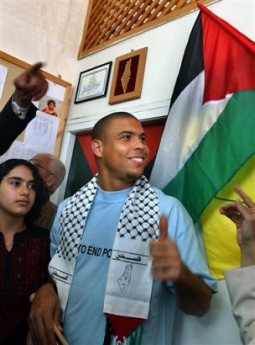
While we are on the subject of Brazil, I just saw a story in Al-Jazeera about Ronaldo, a Brazilian soccer player, who came to Palestine to inaugurate a children's center in Ramallah which was named after him.
Wednesday, May 18, 2005
brazil's racial history
assata and cuban racism
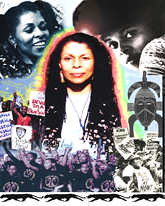
Assata Shakur (former Black Panther, accused and convicted of murder, who escaped from prison and is an exile in Cuba) is back in the news these days. The US State department recently increased the reward for her capture up to $1 million. As a Black Cuban-American who tries to think of himself as progressive it is somewhat tricky to tease apart and correctly delineate my thoughts and feelings on the subject. It's not that I think Assata should be returned. There is no question that the FBI had a policy of framing the Panthers (several have had convictions overturned after years in prison) and there is a strong argument for her innocence.
But at the same time, I wish so many activists wouldn't just simplistically and uncritically ride Castro's jock. Yes the revolution did away with some of the more egregious forms of institutional racism in Cuba and should be given credit for that. But what have you done for me lately?
A really good book which gives a counter-balancing view of race in Cuba, is Carlos Moore's Castro, the Blacks and Africa. Carlos Moore is of West Indian parentage, born and raised in Cuba, and who was later considered "lieutenant" to Afrocentric scholar Cheikh Anta Diop (who comes from a Senegalese Muslim family). The book goes into a lot of detail on the persistent and varied forms of racism in Cuba, even after the revolution. And it goes on to point out how certain expression of difference by Afro-Cubans were seen as dissent and suppressed by the state.
In a lot of ways, the Cuban regime's support for Assata Shakur is very hypocritical because Castro would never tolerate a Black Panther-like party in Cuba. (If one arose, all its members would be swiftly thrown in jail along with the political prisoners Cuba already has). It's pretty clear that Assata and other such figures in the past are being used as pawns by Castro in order to embarrass the US. True commitment to liberation means opposing oppression everywhere whether it is carried out by the US government or Cuban one.
If you don't have time to read Moore's thorough account, some articles available online in similar spirit can be found below:
Cuba Begins to Answer Its Race Question
A brief piece about Carlos Moore which appeared in Essence magazine in 1989
National Identity On Trial: The Case of Post-Revolutionary Cuba a paper by Peter Kwaku Maybarduk
An excerpt from the book, A Nation for All: Race, Inequality, and Politics in Twentieth-Century Cuba
And finally, a more personal piece by Dr. Miguel A. De La Torre about pre-revolutionary race relations in Cuba and his own experiences as a Latino in the US called MASKING HISPANIC RACISM: A CUBAN CASE STUDY
Tuesday, May 17, 2005
guantanamo and the quran
only human
In Christianity, man was made "a little lower than the angels". Human beings are fallen, full of original sin, and are so twisted that it takes a dramatic radical miracle to save humanity. To err is human, to forgive divine. And if a human being shows up who manages to act righteously, the event is so amazing that such a person must be God incarnate.
But in Islamic anthropology, the angels were commanded to bow down to Adam. To be a human being means to be the khalif (vicegerent) of Allah. There is no original sin. We were all born Muslim, according to fitra (nature). Not just Jesus and Muhammad but all the prophets are believed to be sinless. And the prophets don't come to radically change our nature, the come to remind us of the things we already know deep inside. A righteous human being, is just doing what a human being is supposed to be doing, is exemplifying human nature. But when we fall short of that high standard, we are actually less than human, we are acting like apes and pigs.
....
It reminds me of the gom jabbar scene in Dune. The gom jabbar is a kind of test. A person puts their hand inside a special box while someone else holds a poison-tipped needle by their jugular. The box induces strong increasing sensations of pain. But the person being tested must demonstrate a strong determination, willpower, and concentration and keep their hand in the box or else they will be killed with the needle. If they pass the test they will be considered "human". If not, they are an animal.
There are actually a number of other places where Arabic/Islamic themes play a role in the Dune stories. Here is actually a brief complilation of some of them. And if you are unfamiliar with Dune altogether is the main Dune page on Wikipedia
the pen is funnier than the sword
"i am malcolm x"
nuh washington
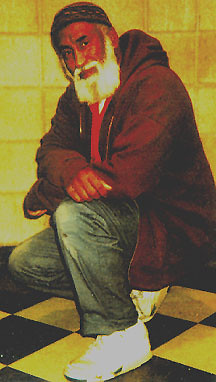
Nuh Washington is another former Black Panther who became Muslim and eventually passed away a few years ago. Here is a page which gives more background about his life.
Monday, May 16, 2005
the people, united...
History can never be made by one man, we must smash this one quickly. History is made only by the masses of the people, this is clear. Even a, cursory glance at the fallacious presentation of history by the American capitalist system, will demonstrate just this. Take George Washington, as bad as he is. Put him in the middle of Valley Forge, by himself, surrounded by the British, he can do nothing. Take Martin Luther King as righteous as he is. Put him in the middle of Birmingham by himself, speaking out against racism, he would be lynched. But you take this same King, you take this same Washington. Put them in Valley Forge, put them in Alabama. Surround them with thousands of people who have the same ideas they do, willing to make those ideas reality and the situation changes drastically.
This was from Kwame Ture (formerly Stokely Carmichael) speaking on BDP's Edutainment album. And he has a point. Alot of people are caught up in personality cults and it has the potential to be counter-productive. It's one thing if the "leader" becomes a role model and an example to learn from, but it can be disempowering if you start to believe that you need to wait for a hero out there to arrive and save you. Like Tina says "We don't need another hero".
Sunday, May 15, 2005
on the beach with dave chappelle
On the Beach With Dave Chappelle
Posted Sunday, May. 15, 2005
In this week's TIME, Christopher John Farley reveals why Dave Chappelle decided to leave his hit show and what he's been up to since he disappeared to South Africa two weeks ago. Last Friday night, TIME Johannesburg bureau chief Simon Robinson met with the comic at uShaka Marine World on the beach in the South African port of Durban. In a ninety minute conversation, Chappelle was eager to set the record straight on why he suddenly left the U.S. and what he's doing in South Africa. Here's Robinson's account:
Dave Chappelle shows up to our interview in a red t-shirt, blue jeans and shiny white sneakers. He lopes around in his usual style, pacing a lot, but does not seem like a man struggling to speak or to order his thoughts at all. He's lucid and thoughtful and a couple of times asks me to give him some time to think about answers. He concedes that he is dealing with a lot of issues and mentions that he had consulted a psychiatrist about a week ago for a forty minute session. He is also quite fastidious about keeping his new sneakers clean and stops at least twice to wipe smudges off their toes.
The first thing Chappelle wants is to dispel rumors—that he's got a drug problem, that he's checked into a mental institution in Durban—that have been flying around the U.S. for the past week. He says he is staying with a friend, Salim Domar, and not in a mental institution, as has been widely reported in America. Chappelle says he is in South Africa to find "a quiet place" for a while. "Let me tell you the things I can do here which I can't at home: think, eat, sleep, laugh. I'm an introspective dude. I enjoy my own thoughts sometimes. And I've been doing a lot of thinking here."
The picture he paints—and it seems a fairly honest and frank assessment— is of someone struggling to come to terms with a new position and power who's still figuring out how to come to grips with how people around him are reacting to the $50 million deal he signed last year with Comedy Central. Without naming specific characters, he seems to blame both some of his inner circle (not his family) and himself for the stresses created by last year's deal.
"There were things that overwhelmed me," he says. "But not in the way that people are saying. I haven't spent any of the money. All that stuff about partying and taking crack is not true. Why do I live on a farm in Ohio? To support my partying lifestyle?"
The problems, he says, started with his inner circle."If you don't have the right people around you and you're moving at a million miles an hour you can lose yourself," he says. "Everyone around me says, 'You're a genius!'; 'You're great!'; 'That's your voice!' But I'm not sure that they're right." And he stresses that Comedy Central was not part of the problem and put no more than normal television restrictions on what he could do.
"You got to be careful of the company you keep," Chappelle says. "It's hard to know how much to say. One of the things that happens when people make the leap from a certain amount of money to tens of millions of dollars is that the people around you dramatically change.
"During my ascent, I've seen other people go through that wall to become really big. They always said that fame didn't change them but that it changes the people around them. You always hear that but you never really understand it. But now that I'm there that makes a lot of sense and I'm learning what that means. You have to have people around you that you can trust and aren't just out for a meal ticket."
The breakdown in trust within his inner circle seems to have led him to question the material they were producing. He seems obsessed with making sure the material is good and honest and something that he will be proud. "I want to make sure I'm dancing and not shuffling," he says. "What ever decisions I make right now I'm going to have live with. Your soul is priceless." The first two seasons of his show "had a real spirit to them," he says. "I want to make sure whatever I do has spirit."
But Chappelle also says that he must share the blame for the stalled third season. "I'm admittedly a human being," he says. "I'm a difficult kind of dude." His earlier walkout during shooting "had a little psychological element to it. I have trust issues, things like that. I saw some stuff in myself that I just didn't dig. It's like when I brought a girl home to my mom and it looked as if my mom really didn't like this girl. And she told me, 'I like her just fine. I just don't like you around her.' That's how I feel in this situation. There were some things about myself that I didn't like. People got to take inventory from time to time. That's what this [coming to South Africa] is for."
This is Chappelle's second trip to South Africa. He first came to Durban, and visited Salim, in 2000. Chappelle won't tell me exactly how he met Salim but describes him as a family friend. A soft-spoken Muslim, Salim seems also to be something of a sounding board to Chappelle, who converted to Islam several years ago. While Chappelle is not doing a formal religious course in Durban, says Salim, who wore a simple cotton robe and hung back through the interview and photo shoot and only spoke when I asked him a question, "if he wants to talk religion then I'm there as someone to talk to." Says Chappelle: "This is kind of my spot where I can come to fill my spirit back up. Sometimes you neglect these things if you are running on a corporate schedule." The crux of his crisis seems to boil down to his almost obsessive need to "check my intentions." He uses the phrase a few times during the interview and explains that it means really making sure that he's doing what he's doing for the right reasons.
His family, he says, has been a huge support over the past eight months. "They've been phenomenal really, just incredible. What beautiful people. Everyone loves their family but it's good if you can like them too."
His religion is also crucial. "I don't normally talk about my religion publicly because I don't want people to associate me and my flaws with this beautiful thing. And I believe it is a beautiful religion if you learn it the right way. It's a lifelong effort. Your religion is your standard. Coming here I don't have the distractions of fame. It quiets the ego down. I'm interested in the kind of person I've got to become. I want to be well rounded and the industry is a place of extremes. I want to be well balanced. I've got to check my intentions, man."
That includes planning for the future. When I ask him if he would ever buy a place of his own in South Africa, Chappelle replies, "First of all I've got to make sure I've got a job."
He says that he's only been recognized five or six times in the two weeks he's been here. "It happens so sporadically that when it does it freaks me out because I have to remember, 'Oh, yeah, I'm famous.'" At the end of our interview/photo shoot an American woman does recognize him. "Number seven," he cries. "Wow, I'm not that big in Africa. I've got to do an action film here."
During most of the hour and a half that we talk, Chappelle is serious and introspective. But he still has his sense of humor, which comes out as we near the end of our conversation: "Is that enough to prove I'm not smoking crack or hanging out in a mental institution?"
interview with safiya bukhari
dhoruba bin wahad
At present, Dhoruba Bin Wahad lives in Accra, Ghana where he continues organizing and writing especially on Pan-Africanism and the prison system.
I found a number of interesting links related to his life and activities.
An open letter to Al Sharpton from June 2004
interview with Dhoruba Bin Wahad and Bill Weinberg in 1995
Dhoruba himself wrote Toward Rethinking Self-Defense in a Racist Culture: Black Survival in a United States in Transition from the book "Still Black, Still Strong --Survivors of the War Against Black Revolutionaries" (about Assata, Dhoruba and Mumia)
He also wrote The Siege of Fallujah, Iraq: Another Page in the West’s Long Running War with Islam
Summaries of the cases of several imprisoned political activists (along with Dhoruba Bin Wahad, there is some information on Leonard Peltier, Geronimo Pratt, Mumia Abu Jamal and Marshall Eddie Conway). At this time, Dhoruba Bin Wahad and Geronimo Pratt are the only ones who have been released.
There is a VERY bizzare and VERY eclectic book available free online called The Ibogaine Story: Report on the STATEN ISLAND PROJECT Ibogaine is an experimental drug which is extracted from a plant used in certain Central African initiation ceremonies. Dhoruba Bin Wahad gets his own chapter of the book as a part of a discussion on the anti-drug activities of the Black Panther Party (and he also appears elsewhere). But seriously, the book goes all over the place, from literature, to politics to biblical criticism, to discussions of gnosticism and science-fiction to the history of agriculture to neurology to pharmocology to quantum physics.
mumia abu jamal - death blossoms

In spite of his name, Mumia Abu Jamal isn't a confessional Muslim. He was part of a spiritual collective known as the MOVE Organization led by John Africa. Nevertheless, in his book (available free online) Death Blossoms: Reflections from a Prisoner of Conscience he meditates on his time in prison and shares the following experience in section called the Night of Power....
In Islam, during the holy month of Ramadan, it is said that one night is holiest of all: al Qadr, the Night of Power. According to Islamic belief, it was on this night that the Qu’ran was delivered to the Prophet Mohammed, and it is thus the holiest of all nights. On this night, prayers are granted “for everything that matters.”
The Night of Power is so deeply ingrained in the Muslim heart that a short chapter in the Qu’ran is devoted to it. It begins, as do all chapters therein, with the exclamation, “In the Name of God, the Compassionate, the Merciful,” and goes on thus:
Verily we have sent this
In the Night of Power.
And what will convey to you
What the Night of Power is?
The Night of Power is better
Than a thousand months:
The Angels and the Spirit descend in it,
By permission of their Lord,
For everything that matters.
It is Peace:
This until the rise of daybreak.
I will never forget the Night of Power that shook me, not during the holy month of Ramadan, but in the hot, humid summer of 1995, when I sat on death row’s Phase II with a date to die.
The sun had set behind the hills of West Virginia amid ominous thunderheads, and now the forces of nature struck like a divine assault team.
Lightning stabbed the earth as if in the throes of celestial passion, and so powerful were the bolts that the lights in the block – indeed, the whole jail – flickered out.
On Phase II, lights are kept burning twenty-four hours a day – bright during the day, dim at night – though in fact “dim” at two in the morning is hardly less than bright at noon. Tonight – for now at least – it was completely dark.
I sat on the cool metal table and looked out into the night. Cell lights, hall lights, yard lights, black lights, perimeter lights, and lights on poles had died, and not even stars broke the black carpet. So dark!
Then: a splash of illumination that bathed the hills in blue light, a rolling boom-BOOM of thunder, and a rapid
procession of blinks as lights went out all over the prison complex. It happened again and again and again, and yet again – one sinuous bolt of lightning after the next forking the black sky, then white-washing it to midday brilliance for the brief space of an eye-blink.
I sat there in the first real darkness since my arrival to Phase II, transfixed by the display of such raw, primeval power. The strikes seemed so close, I felt the hair on my arms rise.
The storm moved westward, over the prison and across the hills, and in its magnificent wake, darkness reigned as man’s lights bowed their mechanical heads to the power it had unleashed.
There I sat in the darkness, with less than a month to live, yet I felt better than any other night I spent on Phase II. I felt better even than I did a few weeks later, the night my stay was granted. Why?
Then it dawned on me, like bright writing etched in my brain:
“Here is true power, my son.
See how easily it overwhelms man’s ‘power’?”
Watching the veins of nature pulse through the night sea of air, making – if only for milliseconds – daylight over the hills, I felt renewed. How puny man seemed before this divine dance!
I saw, then, that though human powers sought to strangle and poison me and those around me, they were powerless. I saw that there is a Power that makes man’s power pale. It is the power of Love; the power of God; the power of Life. I felt it surging through every pore.
Nature’s power prevailed over the man-made, and I felt, that night, that I would prevail. I would overcome the State’s efforts to silence and kill me.
Saturday, May 14, 2005
racial jujitsu or the more things change...
From what I gather, the basic idea is the following: We all know that in 2050 or some other magical date further down the road, white people (according to contemporary definitions) will become a minority in the United States. And the naive view (which I can't say I've completely ruled-out) is that new demographic realities will then force American society to be more inclusive and less racist in certain respects. At the very least, the more extreme forms of white supremacy which depend on majority-rule should be significantly weakened.
The bad news suggested by Yancey is that whiteness (which is a social construction anyway) will then morph in ways which will still be oppressive to Blacks. And that just as in the past other immigrant groups (Irish, Italian, Jewish, etc.) "became" white one after another, in time Asian-Americans and Hispanics will also become "white", and African-Americans will remain excluded.
"pretty sneaky sis"
takin' it to the streets
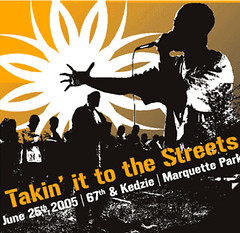
If you are going to be in Chicago on June 25, you should definitely check out Takin' It to the Streets, which is an amazingly positive day-long festival.
Featured Speakers:
Imam W.D. Mohammed, Imam Hamza Yusuf, Imam Zaid Shakir, Imam Siraj Wahhaj, Imam Umar F. Abd-Allah, Ilyasah Shabazz
Featured Performers:
Rock Steady Crew, All Natural, Jurassic 5, Brother Ali, Napoleon, MPAC, Allah Made Me Funny (National Comedy Tour), M-Team, Jamila Fidrause, Kuumba Lynx & Native Lynx
Community Forums and Workshops include:
Unity: Holding Fast to the Rope of Allah
Muslims & Hip Hop - A Forum for Outreach and Activism
Getting Involved with the Day Laborer Campaign (In Spanish and English)
Gender Issues & Islam
The Prophetic Tradition and Working for Social Justice: An Interfaith Perspective
Prisoner Reentry and Public Safety Hearings - IMAN is honored to host this public hearing as part of its work around the issues of recidivism and ex-offender reentry
Co-Sponsored by the Southwest Organizing Project (SWOP) and the Developing Justice Coalition - Please visit the the following link to understand what is entailed in conducting a public hearing:
The main organizers are the Inner-City Muslim Action Network (I.M.A.N.) and you can read about this event and their other projects on their website.
if not us, who?
How does the community organize itself in positive ways? How do we produce appropriate leadership? How do we get better, more effective organizations? Do we need to create flashy high-profile public relations - minded events? Or is it just a matter of encouraging ordinary people to come and do the quiet, non-flashy, anonymous work, and make the small but consistent contributions which improve communities.
I'm just throwing it out there
the last poets
"When the moment hatches in time's womb there will be no art talk. The only poem you will hear will be the spearpoint pivoted in the punctured marrow of the villain....Therefore we are the last poets of the world."
-South African poet, Keorapetse William Kgositsile
The Last Poets were born on May 19, 1968, at a celebration of Malcolm X's birthday. The seven (and seven seems like a fitting number) Black men who at one time or another were a part of the group are: David Nelson, Gylan Kain, Abiodun Oyewole, Felipe Luciano, Umar Bin Hassan, Jalal Nurridin, and the late Suliaman El Hadi.
Several are Muslim, but most are not. One (David Nelson) has become a Christian minister. One (Abiodun Oyewole) helped to found a Yoruba village in South Carolina. Some have re-defined themselves by giving themselves new names. Some have kept the names they were given at birth. The one Afro-Latino member (Felipe Luciano) was a co-founder of the Young Lords Party (a Puerto Rican group modelled on the Black Panthers).
The seven Black men who at one time or another were a part of the Last Poets manifested in themselves a wide and varied expression of the African-American (male) experience, both the positives and the negatives. One such negative is a minor turf war over who even gets to use the name "the Last Poets". Suliaman El-Hadi and Jalal Nuriddin, two Muslim members, have a released a few albums (with more Islamic lyrical content) under the name "Last Poets". But Abiodun Oyewole and Umar Bin Hassan have also released albums, and performed using the name as well (most recently on Def Poetry Jam). I'm not sure if religion was a part of the split between them but the lines seemed like they were drawn that way.
In the book "On a Mission", written by Umar and Abiodun (with Kim Green), Umar
says:I was into the Islamic thing for a while . It touched me, like it touches a lot of brothers who come out of the streets. The religion touches you because the first thing you learn is how to let go of arroogance, indifference, harshness, and coldness. For those who can agrasp the whole idea, it lets you give yourself to your lord and to find your true power.
(Although he later says he became disillusioned with the movement and went back to the streets. This is all before the more recent revival of the Last Poets which some would credit to the release of Umar Bin Hassan's solo album "Be Bop or Be Dead" in the early 90's )
A lot more could be said about the Last Poets and the lives of their members: Their status as the godfathers of conscious hip-hop, their importance as the voice of the 60's and 70's, their connections to the Black Panthers, contributions to Black, Latino, Muslim-American culture, etc.
But here are a few links to give further background information and perspective:
Jalal Mansur Nuriddin's webpage
interview with Abiodun Oyewole an original member of the group
A second interview with Abiodun
general history of the group by Professor R.A.P.
a brief page from This Far By Faith a PBS series about how religious faith acts in people's lives which touched on the Last Poets and Abiodun Oyewole.
a brief biography of Umar bin Hassan
the contrasts between the Last Poets and contemporary hip-hop
The 13 Point Program of the Young Lords from the Sixties Project website
A brief history of the Young Lords
The Young Lords in the context of Puerto Rican gangs in Chicago
siraj wahaj
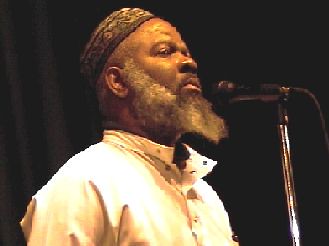
Siraj Wahaj is a well-known African-American Muslim speaker in North America, and a big supporter of Islamic causes. He's currently the Imam of Masjid Al-Taqwa in Brooklyn, New York. Born in New York as Jeffrey Kearse, he became a Sunday school teacher as a teenager, then later went to NYU where he studied Math education. In the 1960's, he became attracted to the Nation of Islam, then later found mainstream Sunni Islam. He changed his name to Siraj Wahaj, which means "Bright Light" in Arabic, and was chosen to receive Imam training at the Ummul Qura university of Mecca in 1978. he also briefly taught a course in Islamic studies at Howard University.
He started his own mosque in 1981 in a friend's Brooklyn apartment. They moved the furniture from the living room to the bedroom so that 25 people could pray toward Mecca. Soon afterward, the congregation, known as Masjid At-Taqwa, bought an abandoned clothing store at a city auction for $30,000 and converted it into a mosque. Today, it is a well-known mosque in New York City.
Imam Siraj has been Vice President of ISNA (Islamic Society of North America) since 1997 and has served on the Majlis Ash-Shura, a consultative council of Islamic scholars, since 1987. He is also a member of the Board of Advisors for the American Muslim Council. He has appeared on several national television talk shows and interviews in America, and was the first person to give an Islamic invocation to the United States Congress.He's well-admired by Muslims in New York at the very least, he led his Brooklyn community in an anti-drug patrol in Brooklyn, New York in 1988, which was a success and put a dent in the drug trade in Bedford-Stuyvesant, and received high praise from the NYPD for his efforts.
He's a fairly prolific speaker, at least in America. He makes many appearances at the major North American Muslim conventions, and numerous forums and lectures in the Northeast US alone. There are many audio lectures given by him in English available online, with titles like "Allah's Word is Supreme," "Are You Ready To Die?" "Confusion of the Ummah," "Control Your Anger," "Easy Way To Paradise," and "Good Or Bad Company:How To Judge."
Friday, May 13, 2005
najee ali and project islamic h.o.p.e.
I just wanted to highlight:
interview with Najee Ali at playahata.com
an interview with Najee Ali at Blackelectorate.com
also, an open letter to Russell Simmons from Najee Ali is available at the Universal Zulu Nation website (along with a whole series of other pieces by activists calling for a more principled take on hip-hop culture).
Thursday, May 12, 2005
remember imam jamil al-amin


A recent conversation made me think about what kind of work (political activism, community services, rehabilitation programs etc.) orthodox Muslims have been doing (or not doing) in the inner cities. And a related question is which Muslim leaders stand out in terms of their stature in urban communities?
One obvious choice to consider is Imam Jamil Al-Amin (formerly H. Rap Brown)
Imam Jamil Abdullah Al-Amin was born Hubert Gerold Brown, the youngest of three children, in Baton Rouge, Louisiana, on October 4, 1943. He acquired the nickname “Rap” from the streets (growing up) as a result of his impressive dexterity with language, combining keen intellect with blunt coarseness.
He attended Southern University from 1960-64. In 1964, he moved to Washington, DC, and became politically involved in the Student Nonviolent Coordinating Committee (SNCC). In May 1967, at the age of 23, H. Rap Brown was elected chairman of SNCC, succeeding Stokely Carmichael.
By 1968, much of SNCC’s leadership had merged into the Black Panther Party for self defense, which had been organized in Oakland, California, by Huey P. Newton and Bobby Seale; Brown would become the organization’s Minister of Justice.
In 1969 Brown’s first book was published entitled, Die Nigger Die! (publ., Dial Press
He is perhaps most famous for his proclamation during that period that "violence is as American as cherry pie".
He was arrested in a shoot-out in 1971 in New York.
He spent five years (1971-1976) in the Attica Prison after a robbery conviction. In prison, Brown converted to Islam and changed his name to Jamil Abdullah al-Amin.
Paroled from prison in 1976, he moved to Atlanta, Georgia, opened a community store and became the Imam (leader) of the Atlanta Community Mosque.
While H. Rap Brown was known for his fiery rhetoric and in your face confrontation, Jamil Al-Amin was known as a quiet, mild-mannered, stabilizing force in Atlanta’s West End community. In the words of 73 year old Hattie Stegall, “I never saw him angry. When someone would die in my family, he would come by and offer his hand. And when the Muslim children would fight my grandchildren, he would make them come to me and apologize.”
Imam Jamil would grow to lead a national community of Muslims, with members scattered around the US and Caribbean.
When Jamil Abdullah Al-Amin moved into Atlanta’s West End, it was reportedly a crime ridden section of the city known for prostitution and drug proliferation. Under Imam Al-Amin’s leadership, Muslims led a renaissance which has resulted in the West End becoming a source of pride for the city of Atlanta. Despite this, however, the Imam’s past coupled with his [Islamic] ori entation would serve as a lightning rod for additional struggle.
On August 7, 1995, Imam Jamil Al-Amin was arrested in connection with the July shooting of a young man who was pressured by authorities into identifying Al-Amin as his assailant. Even members of Atlanta’s Police Department openly expressed amazement when agents of the FBI, the FBI’s Domestic Counterterrorism Task Force and the Bureau of Alcohol, Tobacco and Firearms became involved in a case that the police themselves described as “a routine aggravated assault.” The charges were later proved unfounded and dropped.
In 2002, he was found guilty of killing a Fulton County, Georgia sheriff's deputy and wounding another in a gunbattle at his store. He was sentenced to life imprisonment. (The nature of the evidence against the imam is questionable, and you can read more about the case in the links below)
Just some background on Imam Jamil Al-Amin's case:
from the Student Alliance for Imam Jamil the Peace and Justice Foundation and the Unofficial Website on Imam Jamil Al-Amin and here is another summary of Jamil Al-Amin's life and impact on his community.
Actually, the Peace and Justice foundation website also has a number of links dealing with some past and recent political questions of possible interest to Muslims in the US as well (Amina Wadud, Sudan, the Diallo shooting, the US presidential election, etc.)
Wednesday, May 11, 2005
millions more marching
Trying to be a Muslim
Not the five, but the hundred percent
I repent, because only God is perfect
I make a mistake, a double-take, a retake,
intake forgiveness, mercy from the Merciful
Never find pork on my fork
or beef on my plate
I relate to all that's in existence
don't give me no resistance
don't test me
the cops, they can't arrest me, because I don't do nothing shady..
Malcolm was played by the Nation
slayed by the Nation
I think we've been delayed by the Nation
A million men facing all in one direction
Common called it resurrection
but I don't see the ascension because
The ghetto is still the ghetto
The man is still the Man
A snake is still a snake do you think you can understand why
The ghetto is still the ghetto
The man is still the man
A snake is still a snake so can you help me understand.
And the rest is hip-hop non-history...
I'm sharing because the 10 year anniversary of the Million Man March is coming up and Farrakhan is planning another gathering on the mall under the umbrella of the Millions More Movement.. And of course, contraversy is already being stirred up about the event.
Abe Foxman of the ADL has called on African-American leaders to reconsider supporting the event because it is being organized by Louis Farrakhan (of the Nation of Islam) and Malik Zulu Shabazz (of the New Black Panther Party) on the grounds that they are anti-semites.
Russell Simmons released a good response which you can read at Adisa's Holla at a Scholar blog.
(Actually, the past couple of entries over there have been really interesting, but anyway...)
The crux of the statement to Abe Foxman is as follows:
Simply put, you are misguided, arrogant, and very disrespectful of AfricanAmericans and most importantly your statements will unintentionally orintentionally lead to a negative impression of Jews in the minds of millionsof African Americans. Similar to how you single-handedly caused millions of persons to flock to see the ³Passion of Christ² in defiance of your call for non-attendance, you are going to precipitate a tremendous negative defianceof your demands that will again severely hurt and harm relations between Jews and African Americans.
You should refrain from pressuring African American leaders to denounce Minister Farrakhan and the Millions More Movement. This commemoration is as a real opportunity for establishing healing, reconciliation and fostering amore effective environment for constructive dialogue between Blacks and Jews. We want a society and world were there is no hatred, anti-Semitism,violence, or poverty.
There is a disturbing pattern, and this is just a recent example, of Jewish Americans condemning certain Black leaders, based on accusations of anti-semitism. From Malcolm X, to Jesse Jackson, to Amiri Baraka, to Stokley Carmichael (Kwame Toure). The accusations are often made based on isolated comments taken out of context. And the accusation of anti-semitism is often used to entirely dismiss and ignore any other significance a person's life might have.
What is also disturbing is the obvious double-standard involved in how American society views racism in its leaders. Senator Trent Lott can look back nostalgically at Jim Crow and the Confederacy without suffering serious political consequences. Senator Jon McCain can use the racist term "gook" without reservation and then refuse to apologize (at first) for it, and he's still considered a highly respected member of congress.
It would be wonderful if we lived in a world where all forms of racism were opposed. But it seems clear that in some cases, outdated accusations of racism are being cynically used in order to silence certain voices. I wonder if there is any prominent Black leader, opposed to the brutal extremes of Zionism, who hasn't also been accused of anti-semitism?
The way Russell Simmons brought up the Passion raised an interesting issue. I'd always thought that Abe Foxman's opposition to Mel Gibson's film seemed in alot of ways, insincere and misdirected. The film was a relatively faithful portrayal of the Biblical account (When Pope John Paul II saw it, he is reported to have said "It is as it was"). In any case, the portions of the movie which Foxman and the ADL objected to, are based on passages which are ACTUALLY found in the Bible. So if the movie is really anti-Semetic, then ultimately so is Biblical Christianity. And if that's the case, then protesting and criticizing a beloved Christian film is like using a flyswatter against an elephant. You are only going to make him mad.
By the same token, if having the Black community come together in D.C. means embracing the entire ideological spectrum of Black organizations and movements (which obviously includes the Nation of Islam and the New Black Panther Party) and Abe Foxman actually expects Black leaders to disown Farrakhan on his say so, he is only going to make the elephant mad.
Now with that said, of course there are disagreements between orthodox Muslims and the Nation of Islam, and even between the original Black Panther Party and the so-called New Black Panther Party.
And there is certainly room for us to criticize the organizers of the Millions More Movement on our own terms, and for own reasons, but it is counter-productive to do so because outside organizations command it.
.....
Here is an interesting 1998 interview with Mos Def in the San Francisco Bay Guardian about Khalid Muhammad and one of the Million Youth Marches
Tuesday, May 10, 2005
free islamic books online
Some I would recommend are:
"Ulum al-Quran" by Ahmed Von Denffer
"Toward Understanding Islam" by Maududi
"The Ethics of Disagreement in Islam" by Taha Jabir al 'Alwani
There are a number of works by Yusuf al-Qaradawi there too. I've only read "The Lawful and Prohibited in Islam" which seemed to me a really nice book with good explanations of the various do's and don'ts. I found it really useful as a beginning Muslim. But I was surprised to find out that in some circles Qaradawi is a very contraversial figure.
Also, a number of the Islamic pages in my links section have a pretty substantial collection of writings as well. Especially the Hizmet Books site which has a number of texts, many of which are from a Hanafi perspective. I especially like "Belief and Islam" and "The Sunni Path" which give some really nice descriptions of certain concepts, even though at times the English is a little spotty.
Monday, May 09, 2005
nicomedes santa cruz
shaggy flores
Jaime Flores is better known as Shaggy the Modern Day Griot, Nuyorican, Massarican, Bilingual, Spanglish Speaking, AfroTaino, Revolutionary, Santero Poet from the Dark Souls Collective.
I think he's a good counter-example which helps reveal some of the limitations of the earlier article on Black Hispanics. If you look at his website, he is obviously light-skinned (although darker than Michael Jackson...lol) at the same time he is obviously joyfully identifying with African component of his Puerto Rican heritage.
Perhaps in certain contexts, it is more useful to think of Latinos in terms of Indo-Hispanics (somewhere along a continuum between white and Indian) or Afro-Hispanics (somewhere along a continuum between white and African). And then we should realize that culture is often very often not reflected by phenotype (how people look).
what race are hispanics?
Both this article and the previous one are from a site called Hispanic Trending which seems to be about how business can best advertise and market their goods to the Latino market. I guess that could be a good thing if it helps corporations to serve Latino consumers better and results in more relevant producucts, and helps maximize Latino buying power. It also would be good to helo Latino-owned businesses in Latino communities be more effective. But if neither of those things is happening I wonder if the net effect is just to help wealth flow out of the community.
Sunday, May 08, 2005
black hispanics struggle for their racial identity
Black Hispanics struggle for their racial identity
Actually, the more I think about it, the more problematic I find the article, and I think the topic should have been covered alot better. But it is sort of interesting that the article appeared at all.
vacation pictures
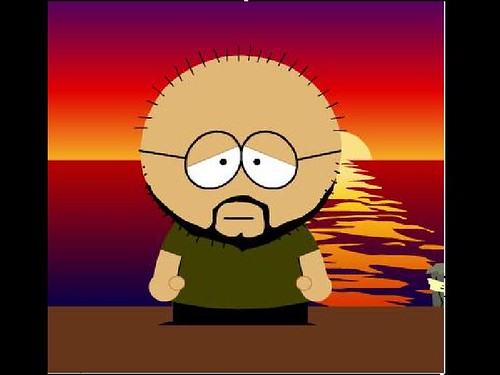
I noticed that a couple of blogs had pictures that looked like they came out of South Park so on a hunch I did a search, and found this site.. There are a decent number of options available (in terms of hair, expressions, clothing, props, etc.), but once you have the image you need to do a screen capture and manipulate it with some other program like Adobe. Anyway, enjoy.
Saturday, May 07, 2005
the notorious p.o.p.e.
two muslim girls being detained in ny
have been in detainment for over a month now, and are suspected of involvement in a suicide-bombing plot.
Two teen girls in custody after bomb plot is feared
The Associated Press
NEW YORK — Two 16-year-old girls have been detained since last month on immigration violations amid concerns that they were potential recruits for a bomb plot that never materialized, officials said Thursday.
The girls — one from Bangladesh, one from Guinea — were picked up by authorities March 24 and put in a detention center, the officials said. They had been living in New York.
Details about the case, first reported Thursday by The New York Times, were sketchy, and a supporter of one of the girls said the accusations are false.
The Times cited a government document in which the FBI said the girls posed “an imminent threat to the security of the United States based upon evidence that they plan to be suicide bombers.”
Two law enforcement officials confirmed the content of the document, but suggested that it might have exaggerated the threat.
Investigators were concerned that girls might be recruited in the future for a suicide mission by a suspect in an ongoing terrorism investigation, one official said. They decided to detain the two before they could become involved.
The law enforcement officials declined to discuss the terrorism investigation. Calls to the FBI's New York office were not immediately returned.
Marc Raimondi, a spokesman for U.S. Immigration and Customs Enforcement, confirmed that two juveniles had been arrested on “administrative immigration violations” and remain in custody.
Friday, May 06, 2005
kingdom of heaven
On the other hand, I haven't yet seen the movie so what do I know.
different trajectories: quraysh ali lansana
On September 13, 1964, Quraysh Ali Lansana was born Ron Myles, the African American great grandson of a full blooded Tsalagi Cherokee. Sixth child. Youngest child. Second boy. Not completely on his parents' agenda, in a crowded two-story house in a culturally diverse, working class neighborhood in Enid.Reading this made me sad. I don't remember how I first heard about Lansana (several years ago), but his name obviously made me wonder if he was Muslim. As it turns out, he was, but not any more. I don't think it's a widely discussed phenomena, but in every religion there will be individuals who are attracted to a particular community, but then later on come to believe that it isn't for them. Amiri Baraka, Sonia Sanchez, and even Wesley Snipes are examples of people in this category, who would have identified as Muslims but then later on moved away.
Five months later. Three gunmen would rush the stage at the Audubon Ballroom and shoot Malcolm X fifteen times. Three years later. Martin Luther King Jr. would step onto the balcony of the Motel Lorraine. Such was the air of Ron's childhood environment, in a home shared by politically active older siblings.
[...]
In 1992, "Brother" Ron Myles converted wholly to Islam. He embraced Islam out of a need for faith, hope and discipline, three things it achieved for him in his life.
On May 1, 1992, buildings in Los Angeles were still smoking from the exploding streets after police were acquitted of the beating of Rodney King. Ron Myles stretched out on his bed, a mattress on a platform in the middle of the main room in the downtown Chicago loft space he shared with Yusef Shabazz, the drummer for the poetry band The Funky Wordsmyths. Ron felt as if he was floating in space, as if he was the huge dark that filled the room. Through the window, he could see the South side skyline bleeding.
He had been studying Sunni Islam since 1991, and on that night he turned to the Quran. After praying and meditating, Ron came across the surah of the Quraysh. The Qurayshi. Part of the blood family of the Prophet Muhammad. Caretakers of the Ka' Ba. It was on that night, the young, idealistic man known as "Brother" Ron Myles, deeply immersed in faith and politics, adorned himself Quraysh. And Ali, which means "The Greatest."
On July 25, 1996, as Quraysh wed his beloved Emily, chief Khalilu of Moselolo, their Yoruba babalawo (priest), bestowed the name Lansana upon the two of them. Lansana. From the Mende language of central West Africa, the Sierre Leone area. Lansana. "Storyteller."
The name change was spiritual. Political. It was a method of self-definition and preservation. It freed Quraysh from the shackles of western hegemony.
But there would come a time in his life when even Islam would become an issue of identity for Quraysh. As he matured, he found the jihads in ancient Africa harder to wrap his head around. He observed faithfully until 1997, then he decided to stop observing the tenets of Islam. Though he no longer refers to himself as Muslim, the reasons why he changed his name are as profound for him today as they were in the early 90’s, and Islam continues to be a great part of how Quraysh sees and moves through the world
I don't know if this is a factor in the cases of the above individuals, but in general, as a community we could probably be doing more to create stronger, more welcoming, attractive Islamic communities; making sure that the young generation growing up in the West, and the new converts coming into the deen have a nurturing place to encourage their growth as Muslims.
Thursday, May 05, 2005
muslim roots of american blues
marvin x
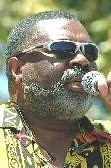
The starting point for Muslim American literature is Marvin X.
--Mohja Kahf, Professor of English and Islamic Studies, University of Arkansas
The most important African American Muslim poet in the United States.
--Julius E. Thompson, African American Review
I'd seen Marvin X's name (who also goes by Maalik El Muhajir) pop up in a few poetry anthologies but it wasn't till now that I could find out much about him or get a sense of where he was coming from. A lot of his focus has been working on poetry and theatre projects as a part of the Black Arts movement in California, where he achieved a certain degree of prominence. But he has certainly not just a local figure. His poetry has even appeared on Al-Jazeera
Some of his religious perspectives are more explicit in the poem "What if there was no God but God" and in the outline for a project called "Toward A Radical Spirituality" Both are available here along with a large sample of some of his other works.
......
Obviously, Marvin X came to identify as "Muslim" through the Nation of Islam, but it isn't clear to me where he stands now in terms of certain problematic doctrines. It brings up the whole general issue of what is the best way to think of the Nation of Islam and the people who went through that experience.
It is clear that there are a large numbers of American Sunni Muslims today who wouldn't be Muslim at all if it weren't for the direct or indirect actions of the Nation of Islam. Some actually became members of the Nation, and held on when W.D. Muhammad reformed the organization more towards orthodoxy. Others were never members, but were intrigued by the charisma of individuals like Malcolm X or Farrakhan, but then on futher investigation, found their way into the fold. But either way, that was the means Allah chose to bring Islam to a huge section of the ummah in America. So instead of demonizing the group categorically, or giving them nasty nicknames like the Nation of Kuffarrakhan or alienating them in other ways, it makes more sense to think of them as a valuable and perhaps necessary transition point. Arethey where they should be in terms of correct belief? Probably not. But you don't win hearts over by insulting them.
Although there are still issues of concern, Farrakhan has been encouraging his followers to follow the pillars in a more orthodox fashion. And in recent years there have been some moves towards reconciliation between the Nation of Islam under Farrakhan (there are actually multiple organizations who use the name) and the more orthodox W.D. Muhammad. On top of that, I've known a "card-carrying" member of the Nation of Islam who has told me that they never believed that Fard was Allah (in spite of what other members might believe) This isn't to say that the Nation of Islam are Ahl al-Sunnah wal Jamaat (in the sense of following one of the four Sunni schools in matters of fiqh, and either the Ashari or Maturidi schools in matters of aqueeda). But orthodox or not, I'm only suggesting that members of the organization can be Muslim.
amina wadud interview
Wednesday, May 04, 2005
sunni - shia
At least, from the sunni side I'm sometimes struck by the extent to which it is possible to have love and respect for Ali (ra) and Ahl al-Bayt (That's why I think the sunni Ahl al-Bayt site is so interesting). We all are supposed to accept the Quran, we all are supposed to follow the sunnah, we all are supposed to love Ahl al-Bayt, including Ali (ra).
Occasionally shias often point out the fact that the sunni hadith collections themselves have many exalted things about his status. (e.g. "I am the city of knowledge, and Ali is the gate" or "You are to me as Aaron was to Moses, except there are no prophets after me"). And those things are true, but the question is just how those hadith are to be understood.
What is even more striking (to me anyway) is the fact that almost all the sunni sufi tariqats (except for the Naqshbandis, and perhaps one other) trace their spiritual lineage (silsila) through Ali. So on the one hand, while accepting the status of all four caliphs, sunnis still can say that Ali had a particularly unique spiritual position. (And in the Naqshbandi tradition, some of the other shii imams appear in the lineage instead.) I've even heard a recording of Nuh Ha Mim Keller saying that Ali was the companion he personally felt the closest to because he saw him (ra) in a dream.
On top of that, even though sunni Islam doesn't have the concept of imam (in the shia sense), the sufis do speak of certain individuals being al-insan al-kamil (perfect/universal men) or qutbs (poles) of the age. And these stations would then necessarily be applied to Ali (by the sufis, at least). So without saying that Ali was robbed of his position by the other companions, it is still possibly to recognize the special spiritual status of Ali.
I feel like I'm rambling... but what I'm trying to say is that if a sunni can say all those things and still be sunni, then where exactly is the disagreement?
weirdness...
Let's hope airport security guards have a sense of humor...
daniel abdal-hayy moore


Speaking of an American Muslim culture, I think Daniel Abdal-Hayy Moore must have been the among the first American Muslim poets I'd heard of in my life. And his book, Ramadan Sonnets must be the first published book of consciously religious American Muslim poetry I've seen. (But now with the democracy of poetry slams and open mikes things are opening up in all sorts of ways) He seems to have been a "hippie" in his youth who hung out with the Beats such as Lawrence Ferlinghetti (who I actually really like) but was ultimately attracted into Islam through Sufism and actually stopped writting poetry altogether for an extended period of time (10 years) But in around 1980 he "renounced" his renunciation and starting actively participating in the poetry scene again.
More of his works are available in the Deenport poetry section
american muslim culture
What I have in mind by "American Muslim culture" is just the natural product of Muslims, living in America, getting together, letting their creative juices flow and expressing themselves. Not just becoming doctors, lawyers and engineers (which are perfectly good occupations) but also becoming writers, performance poets, calligraphers, photographers, musicians or even comedians (also good occupations).
Not just maintaining and repeating the cultural forms from "back home" but coming together with Muslims here and creating and inventing new ones.
Before Planet Grenada, in the back of my mind, I knew there were isolated Muslims or small groups of Muslims, out there doing these things, but it wasn't till now, with the process of reading and writing about them, that it really sunk in how much has already been done. (This is especially true in jazz and hip-hop where many Muslims have gotten a high degree of mainstream recognition for their skills).
Right now, Muslim culture in the United States is still in its early early stages, but with more networking and organizational/institutional support it could grow into something amazingly beautiful. Muslim hip-hop forums, Muslim writers groups, Muslim poetry open mikes, artist collectives, etc. It is encouraging to see these connections being made and I can't wait to see what the future will hold.
Monday, May 02, 2005
spanish fatwa against bin laden
On March 11 (the anniversary of the Madrid bombing), Mansur Escudero, the Secretary General of the Islamic Commission of Spain issued a fatwa against Osama Bin Laden. Here is coverage at Al-Jazeera and the Christian Science Monitor and here is the original fatwa in Spanish and the text of the fatwa in English
let us be moors
This amazing and wide-ranging paper ends on an inspiring tone:
With African-American and Latino converts speaking of the tragedy of 1492, and with Muslim minorities in the West becoming increasingly race-conscious and inspired by black America, the world is witnessing a new fusion between Islam and pan-Africanism. Today, however, this racialized Islamic internationalism contains elements of other cultures and diasporas as well. Islam is at the heart of an emerging global anti-hegemonic culture, which post-colonial critic Robert Young would say incarnates a "tricontinental counter-modernity" that combines diasporic and local cultural elements, and blends Arab, Islamic, black and Hispanic factors to generate "a revolutionary black, Asian and Hispanic globalization, with its own dynamic counter-modernity...constructed in order to fight global imperialism."
Sunday, May 01, 2005
may day
I was considering trying to come up with something deep to say about Islam and labor and finding all sorts of subtle nuanced connections between the two, but no such luck. Like most religions, Islam teaches that people ought to be treated fairly (and in particular this includes workers). If you want to see a couple of nice quotes on that point, here is a pamphlet. If you want more, entire books which discuss Islamic economics (and its underlying moral principles) have been written and several are available online. From my perspective it is clear that Islam strongly and clearly (more so than certain other faiths) affirms the rights of workers.
Unfortunately, what Muslims DO is another question. Inshallah as an ummah we'll come back to our principles and the sorts of abuses which happen to foreign workers in Saudi Arabi, etc. will come to an end.
But then yet another level to this larger issue comes from the fact that many Muslims are also living in the developing world, and so Muslim laborers tend to be on the receiving end of "globalization" and all the negative consequences which come with that.
So on the one hand, in principle there is a strong Islamic impulse to put ethical constraints on the uses and abuses of wealth, along with other kinds of economic behavior (Islamic texts explicitly mention and disapprove of charging interest, hoarding wealth, jacking up prices in times of scarcity, mistreatment of workers etc.)
But on the other hand even in "fundamentalist" situations, these principles aren't always adhered to.
But in other situations, Muslims (or more precisely, average brown folks living in the developing world, regardless of religion) because of their position in the global economy, would still have a strong motivation to be concerned about economic abuse.
two pieces on islam and american culture
East of the Sun (West of the Moon): The Harmonic History of Islam Among Asian and African Americans by Moustafa Bayoumi. This lecture has three sections, the first one (about the experiences of an Ahmadi missionary in the US) and the third (about the spread of Islam among jazz musicians) were the most interesting to me. A middle section about Malcolm X wasn't very deep or new.
all that jazz...
Many jazz musicians adopted Muslim names although not all of them were necessarily practicing the faith.
And in Dizzy Gillespie's autobiography "To Be, Or Not ... To Bop" there is an interesting passage discussing why so many African-American jazz musicians were converting to Islam.
And of course, in the intermediate period between be-bop and hip-hop come The Last Poets, which definitely fit in with the themes of Planet Grenada. I've been meaning to write something about them but I wanted to see what was available online first.
Saturday, April 30, 2005
taliyah al-mahdi

In the course of trying to find more about Amir Sulaiman online the name of this group came up. The Asian symbols in their logo makes me think of Dead Prez and their use of the I Ching. Here is their website for more info. I wish I knew more about them. The site is well written. They seem to be coming from a Shia perspective, which seems interesting. They have a set of "12 Points of Action" which includes a study of the world's spiritual traditions, physical and mental training, opposition to terrorism and a strong statement against sexism: "we wash our hands of the oppression of women throughout history and oppose all forms of domination of man over woman." I wonder how well they manage to implement this really positive-sounding program.
If anyone knows more about them, feel free to add a comment. (Actually, that should go for all the blog entries)
amir sulaiman
